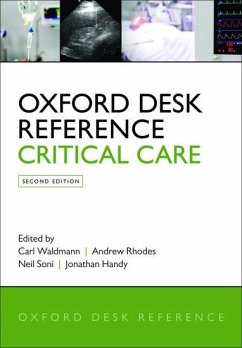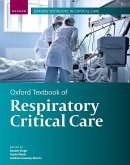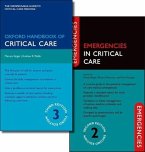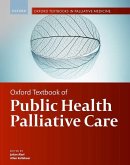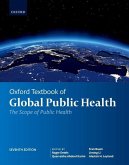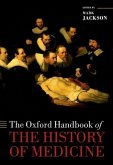Oxford Desk Reference: Critical Care
Herausgeber: Waldmann, Carl; Handy, Jonathan; Soni, Neil; Rhodes, Andrew
Oxford Desk Reference: Critical Care
Herausgeber: Waldmann, Carl; Handy, Jonathan; Soni, Neil; Rhodes, Andrew
- Gebundenes Buch
- Merkliste
- Auf die Merkliste
- Bewerten Bewerten
- Teilen
- Produkt teilen
- Produkterinnerung
- Produkterinnerung
Oxford Desk Reference: Critical Care, second edition is a definitive clinical reference for all aspects of critical care.
Andere Kunden interessierten sich auch für
![Oxford Textbook of Respiratory Critical Care Oxford Textbook of Respiratory Critical Care]() Oxford Textbook of Respiratory Critical Care225,99 €
Oxford Textbook of Respiratory Critical Care225,99 €![Oxford Handbook of Critical Care Third Edition and Emergencies in Critical Care Second Edition Pack Oxford Handbook of Critical Care Third Edition and Emergencies in Critical Care Second Edition Pack]() Mervyn SingerOxford Handbook of Critical Care Third Edition and Emergencies in Critical Care Second Edition Pack88,99 €
Mervyn SingerOxford Handbook of Critical Care Third Edition and Emergencies in Critical Care Second Edition Pack88,99 €![Oxford Handbook of Critical Care Oxford Handbook of Critical Care]() Mervyn SingerOxford Handbook of Critical Care66,99 €
Mervyn SingerOxford Handbook of Critical Care66,99 €![Oxford Textbook of Public Health Palliative Care Oxford Textbook of Public Health Palliative Care]() Oxford Textbook of Public Health Palliative Care145,99 €
Oxford Textbook of Public Health Palliative Care145,99 €![Oxford Handbook of Nephrology and Hypertension Oxford Handbook of Nephrology and Hypertension]() Simon SteddonOxford Handbook of Nephrology and Hypertension56,99 €
Simon SteddonOxford Handbook of Nephrology and Hypertension56,99 €![Oxford Textbook of Global Public Health Oxford Textbook of Global Public Health]() Oxford Textbook of Global Public Health489,99 €
Oxford Textbook of Global Public Health489,99 €![The Oxford Handbook of the History of Medicine The Oxford Handbook of the History of Medicine]() Mark JacksonThe Oxford Handbook of the History of Medicine230,99 €
Mark JacksonThe Oxford Handbook of the History of Medicine230,99 €-
-
-
Oxford Desk Reference: Critical Care, second edition is a definitive clinical reference for all aspects of critical care.
Hinweis: Dieser Artikel kann nur an eine deutsche Lieferadresse ausgeliefert werden.
Hinweis: Dieser Artikel kann nur an eine deutsche Lieferadresse ausgeliefert werden.
Produktdetails
- Produktdetails
- Verlag: Hurst & Co.
- 2nd edition
- Seitenzahl: 704
- Erscheinungstermin: 20. Oktober 2019
- Englisch
- Abmessung: 254mm x 180mm x 38mm
- Gewicht: 1500g
- ISBN-13: 9780198723561
- ISBN-10: 0198723563
- Artikelnr.: 55468979
- Herstellerkennzeichnung
- Libri GmbH
- Europaallee 1
- 36244 Bad Hersfeld
- gpsr@libri.de
- Verlag: Hurst & Co.
- 2nd edition
- Seitenzahl: 704
- Erscheinungstermin: 20. Oktober 2019
- Englisch
- Abmessung: 254mm x 180mm x 38mm
- Gewicht: 1500g
- ISBN-13: 9780198723561
- ISBN-10: 0198723563
- Artikelnr.: 55468979
- Herstellerkennzeichnung
- Libri GmbH
- Europaallee 1
- 36244 Bad Hersfeld
- gpsr@libri.de
Carl Waldmann is Consultant in ICM and Anaesthesia at the Royal Berkshire Hospital in Reading and Dean of the Faculty of Critical Care. Apart from his interests in the management of Head Injured patients in a DGH, the procurement and implementation of a Clinical Information System in ICU, his passion has been setting up and running an ICU follow-up clinic in Reading. From May 2007 to May 2009 he was President of the ICS, editor of Care of the Critically Ill and until 2004 the editor of JICS. Carl was also Chair of the section of Technology Assessment and Health Informatics [TAHI] of the ESICM until 2008. He was a member of the PACT editorial board of the ESICM and between 2015 and 2018 served as the Treasurer for the ESICM. Carl also has an interest in pre-hospital care and is club doctor for Leyton Orient FC. Andrew Rhodes is a Consultant and Professor in Intensive Care Medicine and Anaesthesia at the St George's University Hospitals NHS Foundation Trust and St George's University of London. He has research interests in the fields of surgery, sepsis, haemodynamics and outcomes related to Peri-operative and Intensive Care Medicine. He is widely published in these areas and is regularly invited to lecture on these subjects all around the World. Andrew has held leadership roles at both a national and an international level. He is a Council member of the Faculty of Intensive Care Medicine (FICM) and a past president of the European Society of Intensive Care Medicine (ESICM). He is the current co-chair of the Surviving Sepsis Campaign. Neil Soni was formerly a Consultant in Intensive Care and Anaesthesia at Chelsea and Westminster Hospital. He trained in Anaesthesia and Intensive Care in Sydney, Australia, and was appointed as Senior Lecturer at Westminster Hospital in London in 1985. Jonathan Handy is a Consultant Intensivist and Anaesthetist at Chelsea and Westminster Hospital and is Clinical Lead for North West London Critical Care Network (patient transfers). Qualifying from University College London Medical School in 1995, he continued his specialist training at Imperial College School of Anaesthesia. He is an editor of the journal Anaesthesia and has developed, taught and directed numerous educational courses including Medical Simulation. His research focuses on acid-base disturbances, lactate in critical illness, development and application of mathematical physiological models, critical care transfers and molecular physiology of critical illness.
1: Respiratory therapy techniques
2: Cardiovascular therapy techniques
3: Renal therapy techniques
4: Gastrointestinal therapy techniques
5: Nutrition
6: Respiratory monitoring
7: Cardiovascular monitoring
8: Tissue Perfusion monitoring
9: Neurological monitoring
10: Fluids
11: Respiratory Drugs
12: Cardiovascular drugs
13: Gastrointestinal drugs
14: Neurological drugs
15: Haematological drugs
16: Miscellaneous drugs
17: Resuscitation
18: Respiratory disorders
19: Cardiovascular disorders
20: Renal disorders
21: Gastrointestinal disorders
22: Hepatic disorders
23: Neurological disorders
24: Haematological Disorders
25: Metabolic disorders
26: Poisoning
27: Shock
28: Infection and inflammation
29: Trauma and burns
30: Physical disorders
31: Pain and post-operative intensive care
32: Maternal Critical care
33: Death and dying
34: ICU organization and management
35: Looking after critically ill children
2: Cardiovascular therapy techniques
3: Renal therapy techniques
4: Gastrointestinal therapy techniques
5: Nutrition
6: Respiratory monitoring
7: Cardiovascular monitoring
8: Tissue Perfusion monitoring
9: Neurological monitoring
10: Fluids
11: Respiratory Drugs
12: Cardiovascular drugs
13: Gastrointestinal drugs
14: Neurological drugs
15: Haematological drugs
16: Miscellaneous drugs
17: Resuscitation
18: Respiratory disorders
19: Cardiovascular disorders
20: Renal disorders
21: Gastrointestinal disorders
22: Hepatic disorders
23: Neurological disorders
24: Haematological Disorders
25: Metabolic disorders
26: Poisoning
27: Shock
28: Infection and inflammation
29: Trauma and burns
30: Physical disorders
31: Pain and post-operative intensive care
32: Maternal Critical care
33: Death and dying
34: ICU organization and management
35: Looking after critically ill children
1: Respiratory therapy techniques
2: Cardiovascular therapy techniques
3: Renal therapy techniques
4: Gastrointestinal therapy techniques
5: Nutrition
6: Respiratory monitoring
7: Cardiovascular monitoring
8: Tissue Perfusion monitoring
9: Neurological monitoring
10: Fluids
11: Respiratory Drugs
12: Cardiovascular drugs
13: Gastrointestinal drugs
14: Neurological drugs
15: Haematological drugs
16: Miscellaneous drugs
17: Resuscitation
18: Respiratory disorders
19: Cardiovascular disorders
20: Renal disorders
21: Gastrointestinal disorders
22: Hepatic disorders
23: Neurological disorders
24: Haematological Disorders
25: Metabolic disorders
26: Poisoning
27: Shock
28: Infection and inflammation
29: Trauma and burns
30: Physical disorders
31: Pain and post-operative intensive care
32: Maternal Critical care
33: Death and dying
34: ICU organization and management
35: Looking after critically ill children
2: Cardiovascular therapy techniques
3: Renal therapy techniques
4: Gastrointestinal therapy techniques
5: Nutrition
6: Respiratory monitoring
7: Cardiovascular monitoring
8: Tissue Perfusion monitoring
9: Neurological monitoring
10: Fluids
11: Respiratory Drugs
12: Cardiovascular drugs
13: Gastrointestinal drugs
14: Neurological drugs
15: Haematological drugs
16: Miscellaneous drugs
17: Resuscitation
18: Respiratory disorders
19: Cardiovascular disorders
20: Renal disorders
21: Gastrointestinal disorders
22: Hepatic disorders
23: Neurological disorders
24: Haematological Disorders
25: Metabolic disorders
26: Poisoning
27: Shock
28: Infection and inflammation
29: Trauma and burns
30: Physical disorders
31: Pain and post-operative intensive care
32: Maternal Critical care
33: Death and dying
34: ICU organization and management
35: Looking after critically ill children

